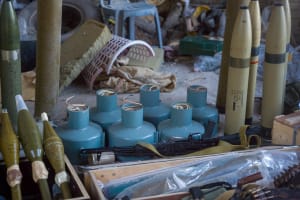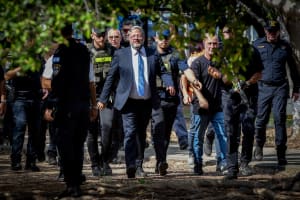Some officials believe Israel needs to declare a state of emergency to fight terrorism
"We must restore public order and sovereignty," says Israel's Foreign Affairs and Defense chairman; PM Bennett calls for "vigilant routine"

Israel may have to declare a state of emergency in order to fight terrorism, according to Israel's Foreign Affairs and Defense Committee (FADC).
FADC Chairman Ram Ben Barak's statement on Monday came after several weeks of terror attacks in Israel during which at least 11 people were killed. One attack took place in Beersheva in the south of Israel, another in Hadera in north-central Israel, and a third in the city of Bnei Brak in central Israel. The terror wave has been described as the deadliest in several years.
“I appreciate that the police has known how to act with restraint and prevent deterioration,” Ben Barak said. “There are two categories of terror: internal and Palestinian. Regarding Palestinian terror, we will not hold back any efforts and the security forces are doing all that is required, including arrests under fire.”
What makes this latest terror wave stand out is that out of the four terrorists who perpetrated the attacks, three of them were Arab-Israeli citizens, affiliated with the Islamic State terrorist movement. The fourth terror attack was carried out by a West Bank Arab resident from a town close to Jenin. He was reportedly a member of the Fatah party’s Al-Aqsa Martyrs’ Brigades.
“Regarding terror originating from within the country, we have gotten to the point where we should weigh declaring a state of emergency for a period of time, to use emergency laws in order to eliminate the phenomenon,” Ben Barak said. “We should use administrative detention and stiffen sentences regarding incitement. The criminal, the nationalistic and terror are mixing together. We must restore public order and sovereignty.”
On Tuesday, Israeli Prime Minister Naftali Bennett said that Israel recently prevented more than 15 “serious attacks that were planned by terrorist elements in the West Bank and the rest of Israel.”
“The last two weeks, in which we have been dealing with severe terrorist attacks, are a wake-up call for all of us,” Bennett said. “It seems to me that there is no citizen in the State of Israel who does not feel the massive reinforcement of the police and security forces in the country. The feeling of security is for us a very, very important goal.”
Bennett stressed that Israeli citizens should continue going about their daily lives.
“In the near future we are in a situation I call ‘vigilant routine,'” Bennett said. “I urge everyone to keep going to work as usual, send the kids to school, go out and travel around the country.”
More than 200 suspects have been arrested and more than 400 individuals connected to terrorist organizations – whether Islamic State or other jihadist groups – have been identified, Bennett also said Tuesday.
Shin Bet, Israel’s internal security agency has many years of experience of combating terrorism. However, the vast majority of their anti-terrorist operations have been focused on neutralizing terrorist threats emanating from Arabs living in the West Bank or the Gaza Strip.
While the large majority of Israeli Arabs are law-abiding citizens, the recent involvement of radicalized Arab Israelis in terrorism constitutes a serious challenge for Shin Bet and other Israeli security authorities. Unlike Arab residents in the West Bank, Arabs who live in Israel have the same legal rights as any Israeli citizens and can move freely throughout the entire country. In its fight against homegrown terrorism, Israeli authorities consequently need to strike the right balance between individual freedoms of its citizens with the need for public security for the society at large.
Israel had been operating under a state of emergency during the pandemic and only recently cancelled that but gave the government the power to call for a "special health situation" should the need arise.

The All Israel News Staff is a team of journalists in Israel.













